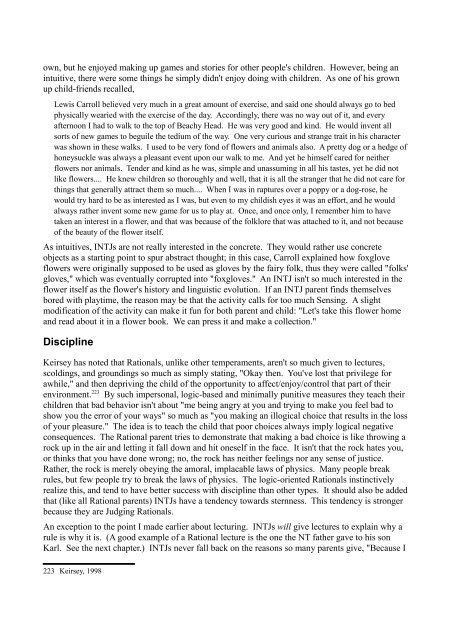Create successful ePaper yourself
Turn your PDF publications into a flip-book with our unique Google optimized e-Paper software.
own, but he enjoyed making up games and stories for other people's children. However, being an<br />
intuitive, there were some things he simply didn't enjoy doing with children. As one of his grown<br />
up child-friends recalled,<br />
Lewis Carroll believed very much in a great amount of exercise, and said one should always go to bed<br />
physically wearied with the exercise of the day. Accordingly, there was no way out of it, and every<br />
afternoon I had to walk to the top of Beachy Head. He was very good and kind. He would invent all<br />
sorts of new games to beguile the tedium of the way. One very curious and strange trait in his character<br />
was shown in these walks. I used to be very fond of flowers and animals also. A pretty dog or a hedge of<br />
honeysuckle was always a pleasant event upon our walk to me. And yet he himself cared for neither<br />
flowers nor animals. Tender and kind as he was, simple and unassuming in all his tastes, yet he did not<br />
like flowers.... He knew children so thoroughly and well, that it is all the stranger that he did not care for<br />
things that generally attract them so much.... When I was in raptures over a poppy or a dog-rose, he<br />
would try hard to be as interested as I was, but even to my childish eyes it was an effort, and he would<br />
always rather invent some new game for us to play at. Once, and once only, I remember him to have<br />
taken an interest in a flower, and that was because of the folklore that was attached to it, and not because<br />
of the beauty of the flower itself.<br />
As intuitives, INTJs are not really interested in the concrete. They would rather use concrete<br />
objects as a starting point to spur abstract thought; in this case, Carroll explained how foxglove<br />
flowers were originally supposed to be used as gloves by the fairy folk, thus they were called "folks'<br />
gloves," which was eventually corrupted into "foxgloves." An INTJ isn't so much interested in the<br />
flower itself as the flower's history and linguistic evolution. If an INTJ parent finds themselves<br />
bored with playtime, the reason may be that the activity calls for too much Sensing. A slight<br />
modification of the activity can make it fun for both parent and child: "Let's take this flower home<br />
and read about it in a flower book. We can press it and make a collection."<br />
Discipline<br />
Keirsey has noted that Rationals, unlike other temperaments, aren't so much given to lectures,<br />
scoldings, and groundings so much as simply stating, "Okay then. You've lost that privilege for<br />
awhile," and then depriving the child of the opportunity to affect/enjoy/control that part of their<br />
environment. 223 By such impersonal, logic-based and minimally punitive measures they teach their<br />
children that bad behavior isn't about "me being angry at you and trying to make you feel bad to<br />
show you the error of your ways" so much as "you making an illogical choice that results in the loss<br />
of your pleasure." The idea is to teach the child that poor choices always imply logical negative<br />
consequences. The Rational parent tries to demonstrate that making a bad choice is like throwing a<br />
rock up in the air and letting it fall down and hit oneself in the face. It isn't that the rock hates you,<br />
or thinks that you have done wrong; no, the rock has neither feelings nor any sense of justice.<br />
Rather, the rock is merely obeying the amoral, implacable laws of physics. Many people break<br />
rules, but few people try to break the laws of physics. The logic-oriented Rationals instinctively<br />
realize this, and tend to have better success with discipline than other types. It should also be added<br />
that (like all Rational parents) INTJs have a tendency towards sternness. This tendency is stronger<br />
because they are Judging Rationals.<br />
An exception to the point I made earlier about lecturing. INTJs will give lectures to explain why a<br />
rule is why it is. (A good example of a Rational lecture is the one the NT father gave to his son<br />
Karl. See the next chapter.) INTJs never fall back on the reasons so many parents give, "Because I<br />
223 Keirsey, 1998




